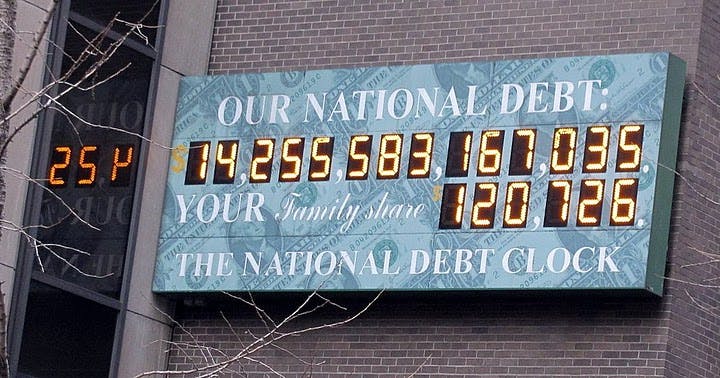Instead of Spending Cuts, Dems in Congress Suggest Scrapping Debt Limits Altogether
The vast majority of the nation’s debt, or about $25 trillion, has been added to its ledgers in the last two decades.

Dozens of Democrats in Congress have proposed an easy fix for a nation that has broached its debt ceiling yet again: Get rid of the limits altogether and give the federal government a blank check going forward.
An Illinois congressman, Bill Foster, and 55 other Democrats in the House have proposed an End the Threat of Default Act, which would repeal the national debt ceiling that limits the amount of money the Treasury may borrow in order to pay for spending approved by Congress.
“Weaponizing the debt ceiling and using it as a pawn in partisan budget negotiations is dangerous and repeatedly brings our nation to the brink of default, which would be disastrous to the U.S. economy,” Mr. Foster said. “The government has an obligation to pay its bills. Threatening to default on our debt is the same as ordering an expensive meal at a restaurant, eating it, and skipping out without paying.”
Debate over the debt ceiling has flared up yet again in Congress after the treasury secretary, Janet Yellen, announced last week that the government has run out of the money it needs to pay its bills. Ms. Yellen said the Treasury can avoid default via “extraordinary measures” until early summer, but is urging lawmakers to raise the $31.4 trillion debt ceiling before then or risk a calamitous government default.
Before they agree to raise the ceiling, however, many Republicans in Congress want the Democrats to agree to spending cuts, up to and including cuts to Social Security and Medicare. President Biden has agreed to meet with Speaker McCarthy on the topic, but he and the Democrats have flatly rejected any conditions to those discussions. It’s a game of fiscal chicken that the parties have been playing for decades.
The vast majority of the nation’s debt, about $25 trillion, has been added to its ledgers in the last two decades. Wars in Afghanistan and Iraq, spending programs such as Obamacare, and the federal responses to both the Covid pandemic and the 2008 financial crises added to the nation’s costs, while tax cuts passed primarily by Republican administrations whittled away at its revenues.
Both parties are equally responsible for the morass. The debt grew by $13 trillion under presidents Obama and Biden, and by $12.7 trillion under the administrations of presidents George W. Bush and Trump. To hear Democrats in Congress tell it, however, the problem lies primarily at the feet of Republicans.
In an opinion article published in the Boston Globe Monday, Massachusetts’ progressive U.S. senator, Elizabeth Warren, suggested that Mr. McCarthy and other “extremist Republicans” are “running a con game,” depicting the struggle as one of fiscal responsibility.
“The House Republican plan for the debt ceiling is about protecting the wealthy and the well-connected from paying their fair share in taxes — nothing more and nothing less,” Ms. Warren said.
Ms. Warren blamed the national debt on what she described as Republicans’ “shoveling tax breaks to the rich.” She described Mr. Trump’s 2017 tax cuts as “the latest blow,” and accused Mr. McCarthy of using the debt ceiling debate as a means of helping to get Mr. Trump elected president in 2024.
Ms. Warren’s suggestions include closing loopholes in the 15 percent alternative minimum corporate tax, taxing stock buybacks even further, joining Europe in imposing a minimum tax on global corporate profits, taxing assets instead of capital gains, and repealing the tax cuts passed in 2017.
“Democrats need to stiffen their spines and say enough is enough,” she said. “Every lawmaker should flat out refuse to cut a single dollar of support for hardworking families and small businesses while billionaire corporations and the ultra-wealthy escape paying taxes.”
Mr. Foster and his cohorts in the House suggesting that the debt ceiling be scrapped, though, seem to have found a novel way to avoid blame altogether and kick the can even further down the road. “We can and should have a real conversation about overall spending, but the full faith and credit of the United States must never be compromised,” he said.

